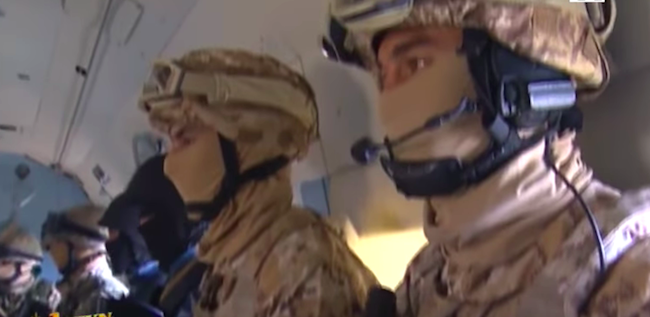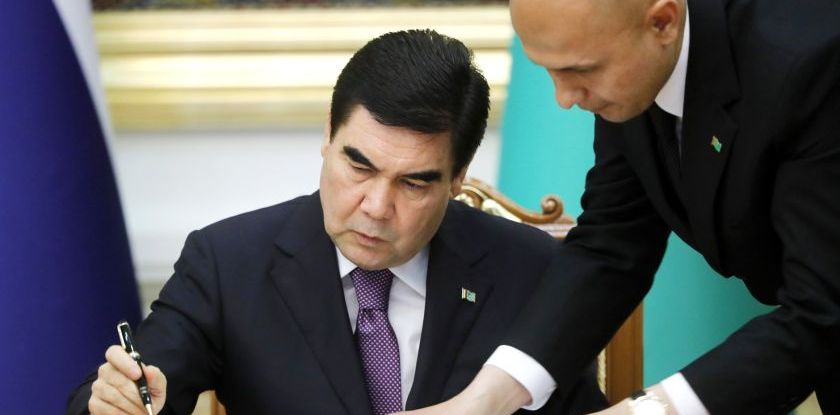A month ago Turkmenistan’s president conducted another splashy event, calling it military teaching. He demonstrated his ability to shoot with various kinds of imported hand weapons, as well as his knife-throwing skills. Also new expensive «toys» were demonstrated — small-scale helicopters, this time purchased in Italy.
Based on the estimates of Turkmen citizens with whom there is a rare chance to talk to in person, everyone agrees that Arkadag (Berdymuhamedov) and Turkmenbashy (Saparmurat Niyazov) are overall the same and even somewhat look alike. But Turkmenbashy has two advantages: he is no longer alive and he was an orphan. Arkadag, on the other hand has sisters and nephews, their wives and children. And there isn’t enough resources for everyone. Especially since now Russia isn’t buying natural gas and there are no funds to pay debts to China and Iran from.
There is essentially not a single serious business object left in Turkmenistan, that isn’t levied with additional tolls, which now go as they say, into pockets of one of the sisters or multiple nephews of the acting president. Whether this really happens, or the additional toll remains with the intermediary, is something the toll-payer cannot check. At one point the «children of lieutenant Schmidt» business took on a mass nature, now, however, their numbers have significantly dropped, but that isn’t making it easy for entrepreneurs: in order to work, it isn’t enough to pay official taxes, and the amount of unofficial tolls isn’t decreasing even in the backdrop of the continuing worsening of the economic situation.
The unemployment rate, the level of which is being hidden, by existing estimates, has long surpassed 50% mark of the able-bodied population. And this indicator doesn’t reflect the entire pictures. In Turkmen families women traditionally do housekeeping chores and raise children. However, this rule has always been determined by the pattern of each family. If a woman wanted to get education, work and make her career, she always had that opportunity. Today, however, Turkmen women are usually forced to work for the reason that unemployment is much higher among men, and they simply cannot find work, thus the woman becomes the single breadwinner.
In this environment, you would think the reputation of military service would go up: if only because, the monetary gains of a military man are usually good. But this doesn’t happen in reality.

Turkmenistan’s armed forces consist of land forces, united between each other air force and anti-aircraft defense, as well as navy. Today they number at a little under 30 thousand military people and civil personnel. Technical equipment of the Turkmen army is at a pretty high level, if you take into account the amount of equipment and its level of modernity. Thus, level of equipment aligns with goals faced by the armed forces, even considering the situation at the Afghan-Turkmen border. The main issue is in the quality of the workforce, its professional preparedness, motivation and moral-psychological state. Armed forces of any state are a part of society, where all the achievements and shortcomings are reflected, as in the mirror. Turkmen armed forces are no exception.
Around 3 years have passed since Turkmenistan started to call on for contractors, mostly as noncomissioned officers for the positions of commanders of ыsection (low branch of army). Most of the contractors go to Turkmen-Afghan border, where the situation has a clear turbulence with growing risks, increasing under the negative influence of middle-eastern conflicts. At the same time turnover rate among contractors is high: the first contract is finished by 4 out of 10 contractors at best.
Formally, military doctrine of Turkmenistan calls for providing security to the country and population, however it becomes difficult to fulfill it with every passing year. There is a concentration of large groups of movements of Taliban and IS in the Afghan provinces of Faryab, Badgis and Jauzjan bordering Turkmenistn that either fight each other or call in a truce and conduct military actions together again Afghan government force.
There are ethnic Turkmen living in the regions of Hamyab and Karkin of Jauzjan province, with whom Turkmen intelligence actively works. In many ways this work can be considered positive, however, according to existing data, on the Turkmen border side for many years there has been activity done from the Afghan side by the representatives of British intelligence, who also conduct aimed work among Afghan Turkmens, and this work has shown results that worry Ashgabat. Their goal is to sway Turkmenistani administration to expand its military cooperation, through the use of additional artificial escalation of the situation at the Turkmenistani border.
At the same time, for Americans (for instance) Turkmenistan is least interesting as a market for sale of military equipment, even though its represented practically in all types of Turkmen armed forces. Americans have always been interested in getting access to Turkmen military airstrips, that remained after the Soviet era. And this interest considering the newly-strained American-Iranian relations in recent times has only been getting stronger.
As a result of activity of mostly British curators, some leaders of Afghani Turkmen communities started voicing dissatisfaction with regard to Turkmen authorities, who due to economic strains reduced their welfare aid. Thanks to this aid, several ethnic Turkmen resistance militia groups were created in the abovementioned Afghani border regions. They didn’t allow Taliban to gain foothold in the border regions with Turkmenistan and prevented armed excursions to the Turkmen territory, related to «Taliban» smuggling heroin into Iran operation. At the same time, one shouldn’t think that these ethnic Turkmen groups became impenetrable obstacles for the flow of heroin. Channels of transfer of heroin from Afghanistan, controlled by Turkmen special forces continued to operate under the current president Berdymuhamedov, the way they operated under Saparmurat Niyazov.
People in the know, say that what can be attributed to Berdymuhamedov is the destruction of regulation of volume of consumption of heroin at the domestic market, that existed under Niyazov. This system worked under patronage of ministry of security of Turkmenistan through 6 subordinate large dealers. Other participants of the illegal flow of drugs were considered illegitimate, there was a constant battle against them, as a result of which annually 5-6 thousand Turkmen citizens were convicted for illegal trade of drugs (a considerable percentage was made up of women and young men under 25).
Berdymuhamedov destroyed this system having put in prison large dealers controlled by the national intelligence (there was a total of 6: one for each valayat plus +1 for Ashgabat). This led to a sudden (3x times) rise in heroin prices in the domestic market, which in turn facilitated a sharp decrease in physical volume of its consumption.
Experts among Turkmen immigrants, including former militarymen say that journalists mostly pay attention to the external factor of security of Turkmenistan, coming from the Afghan territory, however, rarely talk about domestic problems of the state of armed forces. For example, not many people write that in the past 10 years there was a noticeable change in demographic situation, and right now Turkmen armed forces experience a deficit in recruits. Earlier in the mid-90s, they numbered at 100 thousand annually, which more than by three times exceeded the needs of the army.
This explains the following circumstances. According to the first draft of Turkmen constitution, the number of armed forces could not surpass 1% of population, due to which statistical data was artificially inflated. Thus, while Niyazov was still alive, supposedly the 7 millionth citizen was born in Turkmenistan. Even though it was clear that back then and now, the number of citizens of Turkmenistan doesn’t exceed 6 million people, and given the considerable flow of emigration in recent years — comprises around 5.5 million people. Surplus of people of draft age was the reason for passing in 2002 of decision to form military unit from draftees, which were then sent to work in various sectors of the economy and services sphere. However, after 2010 the number of draftees gradually started decreasing.
Changes in demographic situation started to happen not only due worsening of socio-economic situation in the first years after independence, but also due such factors as, for example, the rise in consumption fo hard drugs by younger generation. This problem is still not solved by the Turkmen society (despite the measures described above), and is reflected on the quality of for armed forces. Due to rampant drug use during Niyazov’s years today the amount of healthy draft age men is very low. Already by around late-90s a problem has arose in Turkmenistan, where it was difficult to find a groom for a young girl who wasn’t a drug addict. Then, as well as now, the wealth of a groom was an important factor, but finding a groom that didn’t use heroin became equally important. Thus, current physical and psychological state of draftees is the result of widespread expansion of drug use in Turkmenistan during Niyazov’s rule.

As mentioned above, the state of Turkmen army reflects the problem of the government, including those related to corruption. Being an officer became a dirty business: to retain a family with the officer’s paycheck isn’t viable, even though you are paid regularly while you non-military neighbors aren’t even paid that.
Former major of ground troops of Turkmenistan, currently residing in Turkey says:
«There were always bribes in Turkmen army. However earlier bribes were given so that former students could go serve. If you remember, Niyazov shortened education in school down to 9 grades. Families are big, there is unemployment in villages, there wasn’t even an opportunity under Niyazov to grow onion on your land, in order to sell it on the market. Only cotton and grains. There were 100 thousand draftees back then, while we only needed 27-32 thousand. And people went to the army at 17 just to be able to eat regularly. Bribes were given for that; for a petition to be accepted. Now bribes are given to avoid service and to not be called on. There is nothing to eat at the army».
Bribes are given practically for everything: in order to get into a good military base, in order to get into a good division, etc. Relations between parents of soldiers and officers are built exclusively on monetary basis or gifts (phones, home appliances, etc.
«Today staffing level of divisions of armed forces and customs service of Turkmensitan is less than 40% major explains. Bribes are given in order to retire. Turnover rate is frightening. Once a quarter retired servicemen are called upon, some multiple times. Everyone is leaving. The level of competence of officer corps, is questionable to say the least.»
And most importantly:
«In the best military base there is hazing, however it is not quite the hazing of Soviet army: who served and how many months, is of course important, what is more important is „what velayat are you from, what etrap, village“ This the worse thing that completely ruined Turkmen army».
Our interlocutor paid a bribe to receive the stars of a major. When the time has come, he didn’t have the money for the stars of lieutenant-colonel, plus he was from the wrong tribe and village. So he left for Turkey.
He doesn’t understand why this happens. He remembers how one time Niyazov said: «Any soldier is wholeheartedly ready to die for his president, his people, independence of his country and its perpetual sovereignty». Looks like now nobody is ready to die for Berdymuhamedov.
According to data of Military Strength Ranking, in 2018 Turkmen army went up six positions in the rating of world armies, taking 80th position of the rating (which corresponds to the average level of combatant value). It lags behind Kazakhstan (50th position) and Uzbekistan (39th position), however is above Kyrgyzstan (91) and Tajikistan (96). But ratings are just that, and what’s true will likely be shown by future events in the region. For now the prospects are not good.




